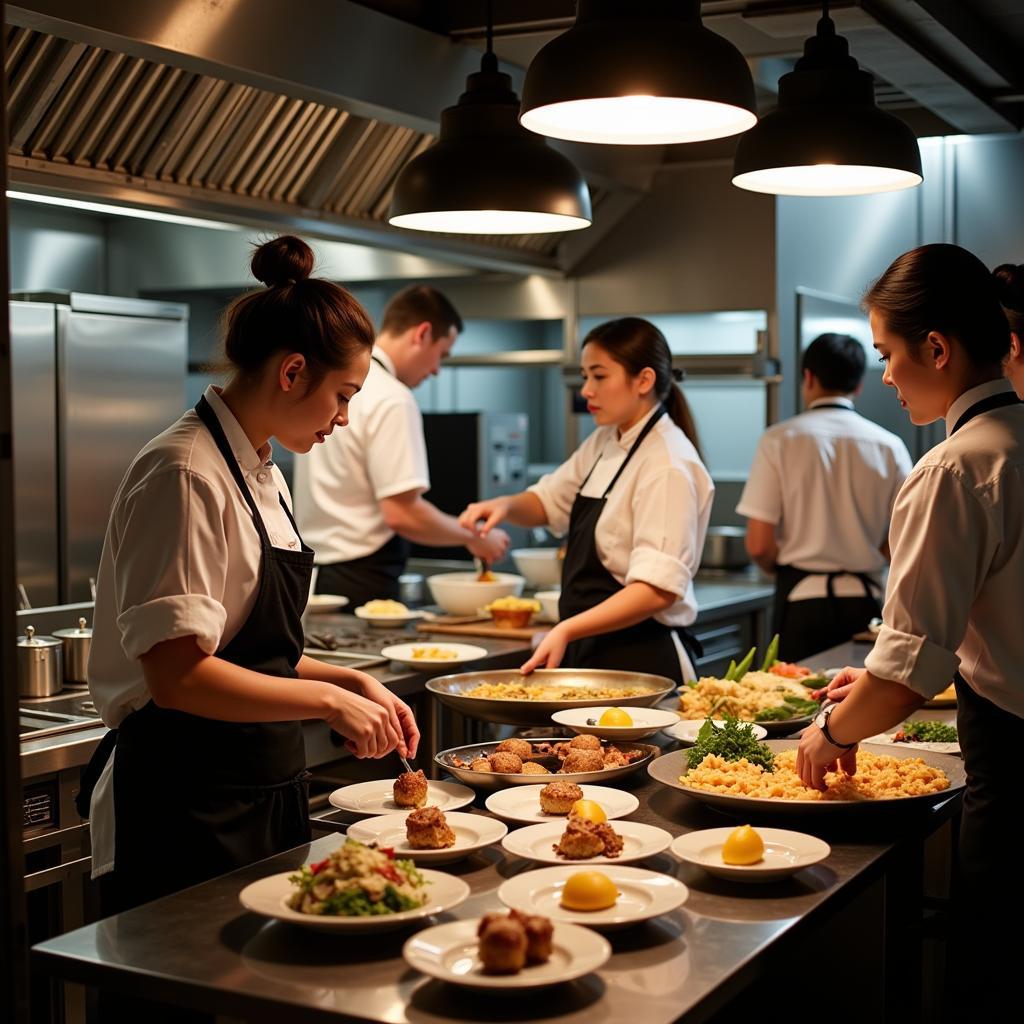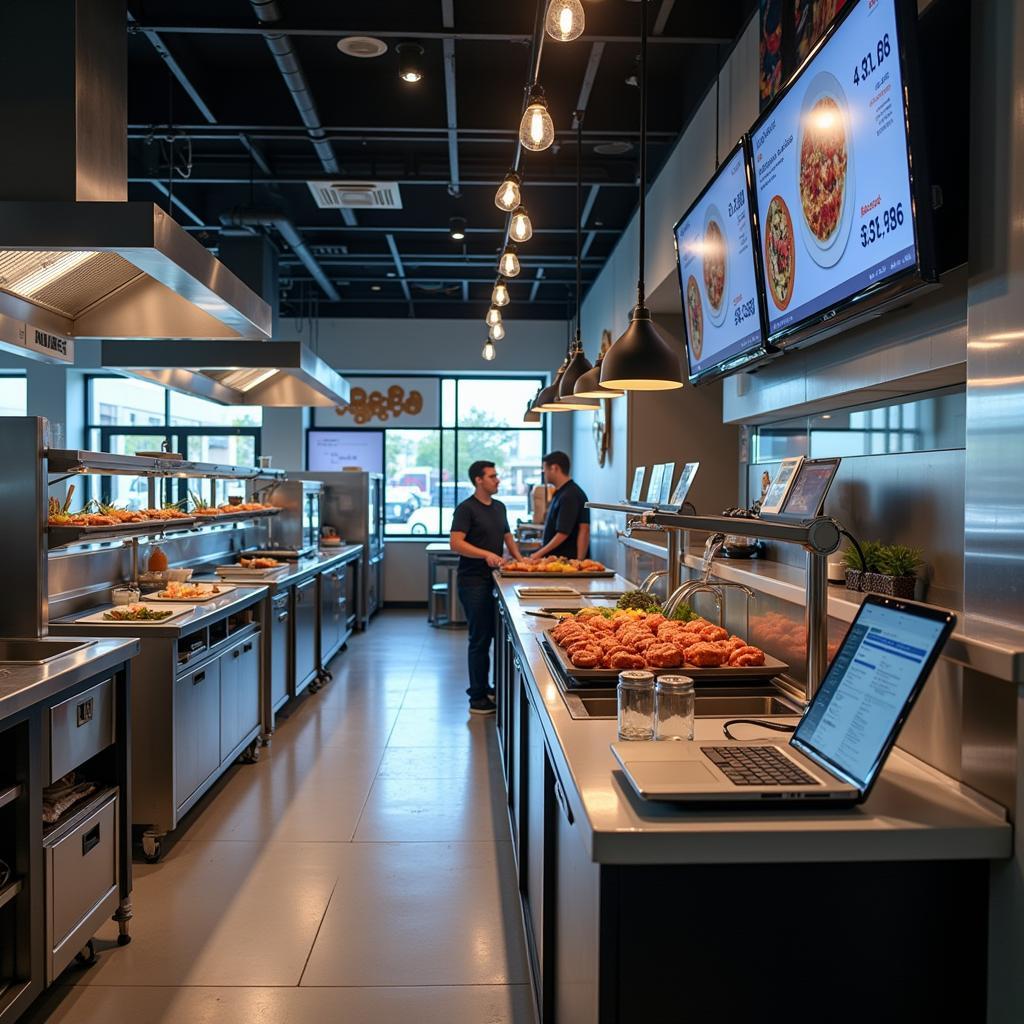The Food And Beverage Department is the heart and soul of any hospitality establishment, driving customer satisfaction and revenue. From bustling hotel kitchens to cozy cafe corners, understanding this dynamic sector is crucial for success in the culinary world. Let’s dive deep into the intricacies of the food and beverage department, exploring its structure, challenges, and future trends.
 Restaurant Operations in a Food and Beverage Department
Restaurant Operations in a Food and Beverage Department
The Core Components of a Food and Beverage Department
The food and beverage department encompasses a wide range of roles and responsibilities, each contributing to a seamless dining experience. Key areas include:
- Kitchen: This is the engine room, where culinary magic happens. Chefs, cooks, and kitchen staff work tirelessly to create delicious dishes, adhering to strict hygiene and quality standards.
- Restaurant/Dining Area: The front-of-house team plays a vital role in customer service, ensuring a pleasant and memorable dining experience. Servers, bartenders, and hosts are the face of the establishment.
- Banquets and Catering: This specialized area caters to larger events and gatherings, demanding meticulous planning, execution, and coordination.
- Room Service (in hotels): Providing in-room dining convenience for guests, requiring efficient delivery and personalized service.
- Bars and Lounges: Often a key revenue driver, requiring skilled bartenders and a curated selection of beverages.
 Training Staff in the Food and Beverage Department
Training Staff in the Food and Beverage Department
What Makes a Successful Food and Beverage Department?
Several key factors contribute to the success of a food and beverage department:
- Exceptional Customer Service: Providing personalized attention, anticipating needs, and exceeding expectations are paramount.
- High-Quality Food and Beverages: Using fresh, high-quality ingredients and employing skilled culinary techniques are essential.
- Efficient Operations: Streamlined processes, inventory management, and cost control ensure profitability.
- Strong Leadership and Teamwork: A motivated and well-trained team, guided by effective leadership, is the backbone of any successful food and beverage operation.
hospitality food often plays a significant role in overall guest satisfaction.
Navigating the Challenges in the Food and Beverage Industry
The food and beverage industry faces unique challenges:
- Fluctuating Food Costs: Managing fluctuating ingredient prices requires careful planning and purchasing strategies.
- Staffing Shortages: Attracting and retaining qualified staff is an ongoing challenge. Investing in training and development is crucial.
- Changing Consumer Preferences: Staying ahead of evolving consumer trends and adapting menus accordingly is essential for long-term success. For instance, the increased demand for jakim halal food reflects a growing market segment requiring specific culinary practices.
“In today’s dynamic culinary landscape, embracing innovation and adaptability is crucial for staying ahead of the curve,” says renowned Chef Anthony Rossi. “Understanding your customer base and responding to their evolving needs is the key to success.”
Future Trends in the Food and Beverage Department
The food and beverage industry is constantly evolving. Emerging trends include:
- Sustainability and Locally Sourced Ingredients: Consumers are increasingly conscious of the environmental impact of their food choices, driving demand for sustainable and locally sourced ingredients.
- Technology Integration: From online ordering and delivery platforms to automated kitchen systems, technology is transforming the food and beverage landscape.
- Personalized Dining Experiences: Catering to individual dietary needs and preferences is becoming increasingly important.
 Technology Integration in the Food and Beverage Department
Technology Integration in the Food and Beverage Department
“Embracing technology is not just about efficiency; it’s about creating a more personalized and engaging dining experience,” says culinary consultant Maria Sanchez.
Conclusion
The food and beverage department plays a critical role in the hospitality industry. By understanding its core components, navigating challenges effectively, and embracing emerging trends, businesses can create exceptional dining experiences and achieve long-term success. The food and beverage department demands a commitment to quality, service, and innovation. Looking for some fun by the pool? Check out these food pool floats. Looking for budget-friendly options? Check out the latest econo foods weekly ads.
FAQ
-
What are the main responsibilities of a food and beverage manager?
-
How can technology improve food and beverage operations?
-
What are some key challenges facing the food and beverage industry today?
-
What are some emerging trends in the food and beverage sector?
-
How can I improve customer service in my food and beverage establishment?
-
What are some effective strategies for managing food costs?
-
How can I attract and retain qualified staff in the food and beverage industry?
When needing support, contact us at Phone Number: 02437655121, Email: minacones@gmail.com or visit us at 3PGH+8R9, ĐT70A, thon Trung, Bac Tu Liem, Ha Noi, Vietnam. We have a 24/7 customer service team.